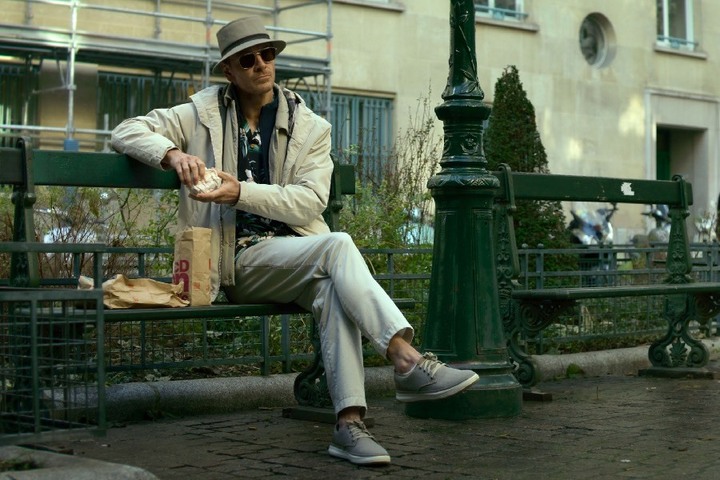The titular killer (Michael Fassbender) in David Fincher’s new caper thriller, “The Killer,” never misses. Or so the man of walking contradictions claims.
The start of the new Netflix film, released on streaming Nov. 10, perfectly sets up The Killer’s self-described “boring” routine as he waits for the perfect opportunity to take his hit while stationed in Paris. It’s clear he’s done jobs like this many times. So many times, in fact, that he’s become conditioned to seeing everything in life without emotion. To him, vulnerability is weakness. Everything is planned out with such methodical and perfect detail that nothing could possibly go wrong. Until, of course, it does.
Although the audience never quite gets a grasp of his past, only knowing him by the many names he goes by when checking in to various hotels around the world, he always remains a fascinating character — if an enigma. His monotone monologues are the closest we get into his interior motives, leading the viewer to question: Was he always this way?
All of these storytelling choices are by design, effectively calculated in Fincher’s intense and unexpectedly hilarious examination of what happens when an assassin misses his shot by a millisecond, leading to an unexpected chain of events. Based on the French graphic novel by Alexis Nolent of the same name, “The Killer” follows the main character sifting and stumbling through his network of employers on a quest for revenge. Along the way, his facade and narrow grip on reality slips through his fingers.
Fincher has become an undeniable household name by directing some of the most original and thought-provoking thrillers in recent American cinema history with “Se7en” (1995), “Gone Girl” (2014) and now “The Killer,” rounding out a remarkable filmography. Taking inspiration from Jean-Pierre Melville’s French noir film “Le Samouraï” (1967), Fincher crafts a modern neo-noir thriller that succeeds at its most mundane and seemingly meaningless. Split into six different chapters and locations around the world, “The Killer” is a deceptively simple thriller with always something brewing underneath the surface.
While “The Killer” isn’t necessarily as direct of a commentary on consumerist culture as Fincher’s satirical “Fight Club” (1999), his choice of modern day references remain just as brilliantly incorporated. Fassbender’s character frequently makes jabs at pop culture and things in his environment. As he carries out the dry day-to-day motions of his operations, he’s seen doing things that could be considered monotonous: eating a McDonald’s sandwich, picking up an Amazon order, talking about booking an Airbnb. The way capitalist and consumerist systems are embedded so deeply in The Killer’s life is uncomfortable and also quite hilarious.
As the lead, Fassbender gives a terrifically subdued performance while bringing a stealth and inhumane physicality to the role. His expression stays largely blank and lifeless for the entire runtime, but his eyes tell the whole story. As a whole, the entire cast is filled with solid performances with the highlight easily being Tilda Swinton’s turn as The Expert. While she’s only in the movie for about ten minutes, her impact on the progression of the story and how she reacts to running into The Killer and the inevitable consequences is haunting.
The visual style is just as sleek and precise as Fincher’s previous films. He works perfectly with frequent collaborator Erik Messerschmidt — previously worked on “Mindhunter” and “Mank” — using shadows and composition to create a consistently eerie atmosphere. The sound design is also quite jarring at times, adding to the unsettling and often surreal experience of the film. The blend with the magnetic, pulsing force by Trent Reznor and Atticus Ross is seamless and carries an electric energy. Oh, and who could forget the countless needle drops by The Smiths?
While Fincher relishes in ambiguity here, at times it can be to a fault, especially in establishing what the killer’s ultimate goal is with all of the people he chases after. Even though the point seems to be that The Killer doesn’t know what he’s really looking for himself, giving him a false goal from the start that slowly falls apart could’ve made for an even more dynamic character study.
The biggest shame here, though, is not being able to see such cinematic bliss on the big screen. Netflix’s basically non-existent theatrical strategy with exciting projects like “The Killer” — clearly made to be seen and appreciated with a huge crowd — feels frankly disrespectful to the art form.
For now, Fincher’s “The Killer” can be greatly admired from the viewer’s household, with the unfortunate reality that this great work of art may never be experienced as fully intended. The film is unlikely to rope in any new Fincher fans with its isolating, numbing nature. But for those already hooked into his work, there’s no doubt that this is a film worth watching, studying and laughing along with.




















